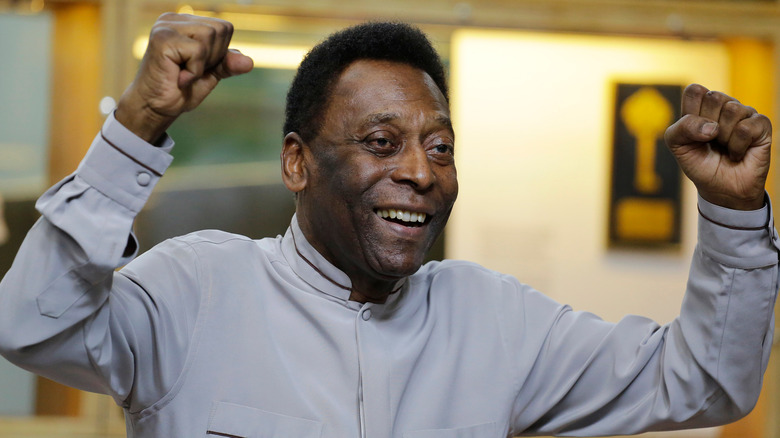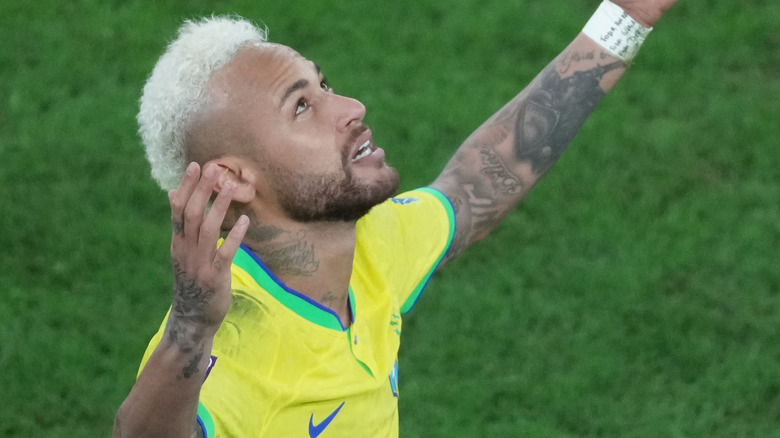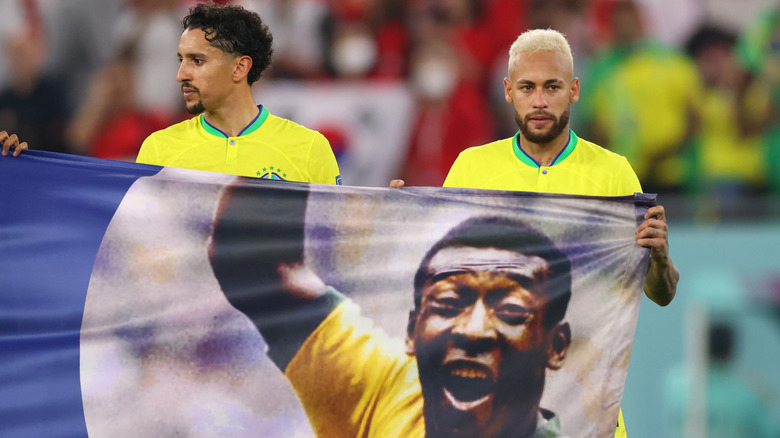Why One Of The Worst Calls In World Cup History Led Pelé To Consider Leaving The Sport
When England played the USA in the 2022 FIFA World Cup, the debate about whether the sport is "really" called soccer or football arose again. Naturally, both are entirely acceptable and there's no truly correct answer, but the conversation is ongoing regardless.
So, too, is the question regarding the sport's greatest-ever talents. For some years, Portugal's Cristiano Ronaldo and Argentina's Lionel Messi have dominated the debate, and many regard the latter's 2022 World Cup win as sealing the deal. During BBC's coverage of the match and its immediate aftermath, per the Independent, former England international Gary Lineker said, "I never thought I'd see a better player than Diego Maradona ... I think Messi's done it through what he's achieved now and his longevity."
No consensus can really be reached, as fans quibble over the difference between the best player(s) of their generation and the all-time greats. Lineker noted that Argentine superstars Maradona and Messi played during very different times for the sport (the former played his last match for his nation at the 1994 World Cup, per BBC) and direct comparisons are difficult, but there's one name that will surely always join theirs in any discussion of the sport's best players ever: Pelé.
The brilliant Brazilian forward's talents were so formidable that opponents were sometimes drawn to desperate measures to try to keep him at bay. So much so that he may have stopped playing forever in response.
The king of football
Today's younger football fans will never have enjoyed the privilege of watching Pelé play soccer live. He won a total of three World Cup tournaments (per Britannica) with the Brazilian national team: 1958, 1962, and 1970. He is a large part of the reason why said team has risen to become one of the most successful and feared in international soccer.
Britannica reports that his career got off to a humble start, but the Santos Football Club found such success with him on board that he was catapulted to worldwide acclaim in short order. Just two years after debuting with the team, he made his first World Cup appearance for Brazil as a teenager. His performances in the closing matches of the tournament sealed the victory and cemented his place as a legend of the game.
There's truly no overstating Pelé's goal-scoring ability, his versatility, or his ability to read the match. In a Red Bull interview in October 2021, Brazilian icon Neymar Jr. reflected on how influential the Pelé has been on his own career. "If someone on the street, on a field or at school would dribble past three players and scored a goal, someone would always say, "you scored a goal like Pelé," Neymar Jr. said. "Pelé to me is the king of football, the biggest idol in Brazil. I have a huge amount of respect for him and for everything he did for our football and country."
Refereeing woes and nightmare tackles
In October 2013, Guinness World Records announced Pelé as the winner of both the Most World Cup Winners' Medals (three) and Most Career Goals awards (an astonishing 1,283). For over two decades, the ace terrorized any opponents who attempted to contain him. In one match, the efforts to get him off the ball were so vicious, and refereeing so questionable, they almost made him want to stop playing entirely.
In the World Cup of 1966 (per the International Football Hall Of Fame), Brazil's third (and final) match was a clash against Portugal. One of the Portuguese players, Morais, committed an awful foul against Pelé. The referee did not send Morais off for the offense. According to The Guardian, the injury was the last straw for Pelé, who had also been fouled repeatedly during his team's first match. According to the outlet, the icon would later reflect on the tournament, stating, "When I first came back to Brazil after the World Cup games of 1966, my heart wasn't in playing football. The games had been a revelation to me in ... unsportsmanlike conduct and weak refereeing."
For a nation renowned for its passionate, exuberant, and stylish approach to the game, it was tragic. As the International Football Hall Of Fame reports, though, the legend had a change of heart and played in the next global tournament, four years later. It was lucky for him and his nation that he did, too: they won it.


